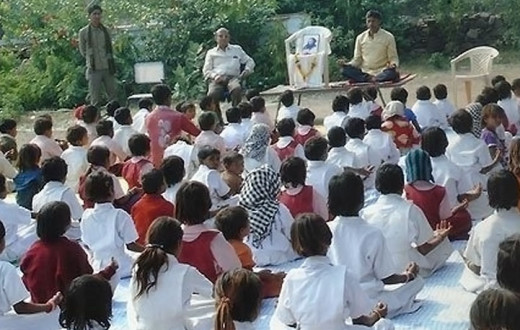Overview
- Natural farming,
rainwater harvesting, stress-relief workshops in Vidarbha
School education,
skills training and health camps in Bangalore and Delhi slums
Hygiene and sanitation,
smokeless chulhas, organic farming in Kapsi
The Integrated Community Development (ICD) model followed by The Art of Living envisions a visible, measurable and sustainable transformation in a community through a holistic intervention strategy that includes:
- Focus on four key themes of health, education, environment and skills development
- Special focus on women and youth empowerment and child protection
- Alignment with CSR guidelines, making it easy for companies to partner with us
This approach is the result of years of experience and the realization that working in isolation on individual sectors cannot be sustainable. One of our most inspiring initiatives has been our free school programs in rural, tribal areas and urban slums. However, in the absence of adequate opportunities for livelihood, convincing parents to send their children to schools has had its challenges. Also, even after completing a school education many of the youth do not find gainful employment. To bridge this gap, vocational training is integrated into some of our schools’ curriculum to augment skill sets and to increase livelihood potential. This is just one of many examples.
We understand that an integrated developmental approach in a community yields tangible developmental outcomes. It is our objective to bring true transformation by impacting all aspects of development through community ownership, making the people themselves true agents of their progress.
Challenges
Development issues in communities are usually inter-related. Before anything else, a community has to have access to basic health and sanitation facilities and clean drinking water. Awareness of the importance of personal health and hygiene is an important first step in improving the standard of living for the community. Education is the next step. Motivating the people to get basic education and also providing them opportunities to use that education to earn a living helps them to improve their economic status. They develop a better appreciation of their surroundings, their environment and of themselves. Healthy and happy communities pave the way for a development cycle that is self-sustaining.
However, achieving this requires committed and sustained developmental efforts that could span several years. The initial phase that addresses deep-rooted and outdated socio-cultural biases is extremely challenging. Moreover, the demand for technical and economic resources for such projects is huge, often requiring the involvement of several stakeholders. The Art of Living is committed to transformation in an Integrated Developmental Model (IDM), and our pilot projects have empowered us to dream and work towards building similar communities in villages all over India.
Strategy
Our strategy to execute complex ICD projects rests on the following pillars:
- Identification of suitable geographies that align with our resource availability
- Needs assessment of the community and strategic alignment with internal competencies to deliver on those areas
- Building long-term partnerships with stakeholders including local community, government representatives, technical partners and corporates and other institutional donors and partners
- Creating strong local community linkages, identifying and training local leaders and ensuring community involvement in decision making
- Meticulous execution, regular course correction and tracking the impact both qualitatively and quantitatively
Impact
The Art of Living has successfully implemented the ICD approach in some pilot projects. The impact in two of those projects is summarized below.
In the drought-stricken Vidarbha region of Maharashtra, lack of water and overuse of expensive chemical fertilizers and pesticides rendered the land infertile and left farmers indebted. The farmers were unable to bear the stress and started resorting to suicide. In the last decade, this region alone has accounted for 70 percent of all suicides in Maharashtra. The Art of Living reached out to 507 villages in this area, and the results have been spectacular.
- In the last two years, no suicide has been reported in 151 adopted villages
- Zero budget farming and natural farming techniques have been taught to almost 16,000 farmers who have now started using these techniques with good results
- Rain-water harvesting techniques have been taught, and 91 soak pits have been constructed to enable water retention that has increased the water availability in the area
- Stress relief workshops have been carried out for over 600,000 locals that have helped them to be more positive and upbeat about their life
The slum areas in Bangalore are model communities in need of holistic development. The Art of Living’s ICD initiatives have been instrumental in the development of these areas.
- We have adopted 30 government schools touching the lives of more than 7,000 children. These schools have better attendance now, and the parents are a lot more involved in their child’s education. This has led to better learning outcomes.
- 10 vocational training centers have been started with programs in computer basics, spoken English, tailoring, yoga, and meditation. A special vocational training program for women – Samruddhi – has also been initiated. Graduates from these programs have been successful in augmenting their income and in becoming self-reliant.
- Door-to-door diagnostic and awareness programs have been conducted for 6000 people in four slums. This has helped in the early diagnosis and treatment of diseases in many people.
Please reach out to us to know more about our ICD projects and how we can partner to bring change.













